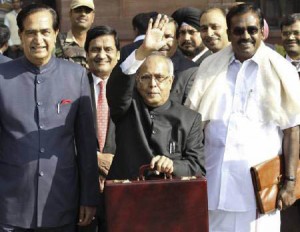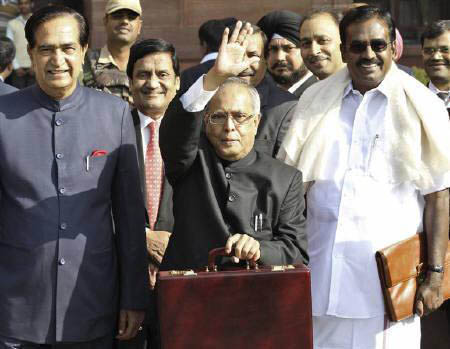By: Ravi Sinha
Track2Realty Exclusive
 Come budget and the real estate sector, like any other industry, comes out with its own wish list. Unfortunately, while other organised industry get a patient hearing through their industry bodies, the Finance Minister seem to be hardly entertaining the sector representatives till recently. Year after year the sector and the industry bodies, CREDAI and NAREDCO only proposed and the government disposed.
Come budget and the real estate sector, like any other industry, comes out with its own wish list. Unfortunately, while other organised industry get a patient hearing through their industry bodies, the Finance Minister seem to be hardly entertaining the sector representatives till recently. Year after year the sector and the industry bodies, CREDAI and NAREDCO only proposed and the government disposed.
Facts speak for themselves. A survey carried by Track2Realty, the real estate market tracker, finds over 90 per cent of the realty companies cribbing that the Finance Minister continues to ignore the sector. The level and degree of dissatisfaction might differ, with 48 per cent extremely fed up, 27 per cent dissatisfied with the intent of the government and 25 per cent being relatively dissatisfied that while the intent of the government may not be negative but policy makers are ignorant with the needs of sector and just don’t understand the ecosystem in which the business of real estate operates.
The survey nevertheless finds that nearly everybody agrees, as many as nine out of ten, that the poor perception and projection of the sector gets reflected in the Finance Minister’s vision document and there is a deliberate attempt to undermine the role that the sector has played in contributing to India’s GDP and as the largest in employment generation. Will the budget 2012-13 be any different or the sector is supposed to get the raw deal yet again and one will only listen to the usual cribbing of the sector in post-budget reaction.
Well, the sector may not get all that it wants, at least in this year budget, but then there seem to be a change in the mindset with even the sector realising that it is better to be pragmatic and not push for things which may make the headlines in the media, but is not granted in the practical terms.
According to the sources, the industry body NAREDCO seems to have made the right chord with the government with its wish list that is consumer oriented but goes a long way in reviving the demand in the housing market which has been very sluggish in the last one year. It is believed that in a bid to boost housing sector credit, the government has agreed to enhance the income-tax exemption for up to Rs 3 lakh paid as interest on housing loans in a year, from the existing limit of Rs 1.5 lakh. The government is considering to raise the tax deduction limit for housing loan in the coming Budget.
Though NAREDCO didn’t officially confirm this information, but Sunil Dahiya, Senior Vice President of NAREDCO said, “I don’t see any disconnect between the consumer interests’ and the wish of the industry at large. If the housing market is revived with the tax exemption, it will be a win-win situation for both the consumers as well as the realty companies. In our memorandum to the government, we have been pretty clear on the issue.”
In order to arrest the declining growth rate, other industry associations have also demanded raising the tax limit ceiling for the housing loan. According to FICCI Secretary General Rajiv Kumar the exemption should be harmonised with the rising interest rates and increased to at least Rs 2.5 lakh.
Echoing views, ASSOCHAM and PHD chamber have also urged the Finance Minister for exemption limit to be raised both for interest and principal. As per the Direct Taxes Code, which would replace the decades old Income Tax Act, there is income tax exemption for up to Rs 1.5 lakh paid as interest on housing loans in a year.
Similarly, CREDAI has also sought policy reforms in the budget and has urged the government to consider Housing as a part of Infrastructure projects thus forwarding the benefits to the industry. CREDAI President Lalit Kumar Jain says real estate will contribute its bit to the progress of the economy but a few forwards by the government in this regard will go a long way in the emancipation of this sector.
“In the budget that the Finance Minister wishes to present before the country we wish to seek some value additions for the real estate sector. Firstly expecting the government to set a trend of policy reforms for the sector we wish to urge the government to exempt all sorts of investment made in the real estate sector from tax. Right now, 78 per cent of the revenues earned by the sector compulsorily goes into the growth and developmental activities of the industry and hence for the same we request an extension in the 80-IB tax slab which will thus help in raising more gains from the real estate sector,” says Jain.
RICS expects the upcoming budget to provide adequate stimulus to the priority areas within urban infrastructure and housing. Sachin Sandhir, Managing Director, RICS South Asia believes there is a dire need for the budget to encourage improvement in supply of affordable and low cost housing along with strengthening access to housing & micro finance. As a matter of fact, RICS has proposed the establishment of a dedicated affordable housing fund, similar to infrastructure funds.
“The Government could contribute partial funding through public issuance of bonds and the remaining component can be raised through retail investments in lieu of tax benefits. These funds should then be made available to developers/ NGO’s/ private intermediates at low interest rates for construction of EWS/LIG housing. Given the rapid urbanisation and pressure on urban infrastructure, the budget should consider incentives and benefits for large scale residential townships; extend ECB limit whilst the Infrastructure Debt Fund needs to be supported with a robust bond market,” says Sandhir.
To what extent the Finance Minister accommodates the wishes of the sector and how far the sector is satisfied with the Union Budget this time around will be known only on march 16th when Pranab Mukherjee opens his Pandora box. What can be easily vouchsafed at this point of time is that there is definitely a level of realism in the expectations of the realty sector. May be they have learnt by trial and error that the road to recognition and industry status can not be substituted by an elevator. As a Finance Ministry official said requesting anonymity, “Now I feel there is more openness on either side, more room for negotiations and more acceptance to the concerns.”





